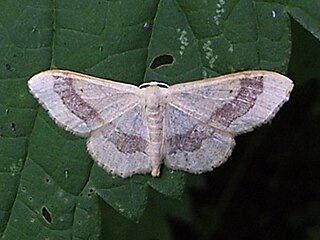
Idaea, sometimes called Hyriogona, is a large genus of geometer moths. It was erected by Georg Friedrich Treitschke in 1825. They are found nearly worldwide, with many native to the Mediterranean, the African savannas, and the deserts of western Asia.

Crambinae is a large subfamily of the lepidopteran family Crambidae, the crambid snout moths. It currently includes over 1,800 species worldwide. The larvae are root feeders or stem borers, mostly on grasses. A few species are pests of sod grasses, maize, sugar cane, rice, and other Poaceae. The monophyly of this group is supported by the structure of the tympanal organs and the phallus attached medially to the juxta, as well as genetic analyses.

The Angeronini are a small tribe of geometer moths in the subfamily Ennominae. The tribe was first described by William Trowbridge Merrifield Forbes in 1948. As numerous ennomine genera have not yet been assigned to a tribe, the genus list is preliminary.

Though small in absolute diversity of genera, the Hemitheini are nonetheless the largest tribes of geometer moths in the subfamily Geometrinae. Like most Geometrinae, they are small greenish "emerald moths". The tribe was first described by Charles Théophile Bruand d'Uzelle in 1846.

Xanthorhoe is a genus of moths of the family Geometridae described by Jacob Hübner in 1825.

Loxostege is a genus of moths of the family Crambidae.

Epirrhoe is a genus of moths in the family Geometridae erected by Jacob Hübner in 1825.
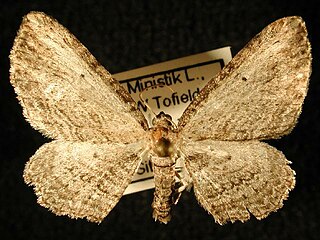
Horisme is a genus of moths in the family Geometridae. The genus was described by Jacob Hübner in 1825.

Orthonama is a genus of the geometer moth family (Geometridae). It belongs to the tribe Xanthorhoini of the "carpet" subfamily (Larentiinae). Nycterosea is usually included here by modern authors, but may in fact be distinct enough to warrant recognition as an independent genus. The genus was erected by Jacob Hübner in 1825.

Perizoma is a genus in the geometer moth family (Geometridae). It is the type genus of tribe Perizomini in subfamily Larentiinae. The tribe is considered monotypic by those who include the genera Gagitodes, Martania and Mesotype in Perizoma. Some other less closely related species formerly placed here are now elsewhere in the Larentiinae, e.g. in Entephria of the tribe Larentiini.

Pero is a genus of moths in the family Geometridae erected by Gottlieb August Wilhelm Herrich-Schäffer in 1855.

Scopula is a genus of moths in the family Geometridae described by Franz von Paula Schrank in 1802.

Hydriomenini is a tribe of geometer moths under subfamily Larentiinae. The tribe was erected by Edward Meyrick in 1872.
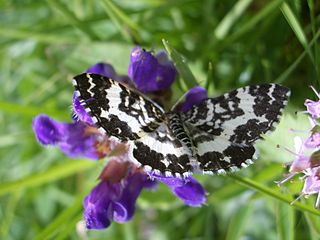
Rheumapterini is a tribe of geometer moths under subfamily Larentiinae.
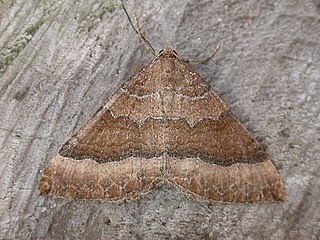
Larentiini is a tribe of geometer moths under subfamily Larentiinae. The tribe was first described by Philogène Auguste Joseph Duponchel in 1845.

Trichopterygini is a tribe of geometer moths under subfamily Larentiinae. The tribe was described by Warren in 1894.

Perizomini is a tribe of geometer moths under subfamily Larentiinae. It was first proposed by Claude Herbulot in 1961. It contains four genera, including the eponymous Perizoma.
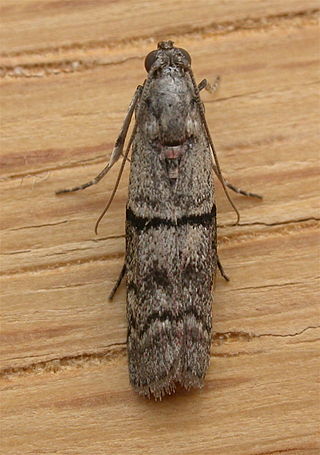
The Phycitini are a tribe of moths of the family Pyralidae.

Sterrhini is a tribe of the geometer moth family (Geometridae), with about 825 species in 19 genera. There are also 6 genera with 36 species tentatively associated with the tribe. The tribe was erected by Edward Meyrick in 1892.
Caberini is a tribe of geometrid moths in the family Geometridae. There are at least 50 described species in Caberini.


















